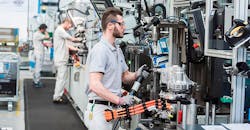Dana Deal Collapses as GKN Loses Fight Against Melrose Hostile Bid
U.K. engineering company GKN Plc lost a hard-fought battle for independence after shareholders opted for a 8.1-billion-pound (US$11.2 billion) offer from Melrose Industries Plc in a takeover that attracted scrutiny from government, a key customer and unions.
Melrose received 52% of voting rights for its cash-and-stock bid, the turnaround specialist said in a statement on Thursday, sending GKN shares to a record. A separate deal struck by GKN to sell its automotive driveline division to U.S.-based Dana Inc. for $6.1 billion will now fall by the wayside.
The outcome brings to a close the biggest hostile takeover struggle between U.K. companies in a decade. Since Melrose made a first approach in January, both companies mounted aggressive campaigns to woo shareholders to their different proposals for the automotive and aerospace parts supplier. Melrose’s bid was triggered by upheaval at GKN late last year including a profit warning and the subsequent firing of its incoming CEO.
“We are looking forward to working with GKN’s talented workforce and to delivering for customers and all stakeholders,” Melrose Chairman Christopher Miller said in the statement. “Melrose has made commitments as to investment in R&D, skills and people and we are very excited about putting these into action.”
‘Worrying Time’
The U.K.’s aerospace industry lobby voiced concern. “This is a worrying time for GKN, its employees, pensioners, suppliers and customers,” ADS head Paul Everitt said by email. “GKN is an important part of the UK industrial landscape and it is important that its owners continue to invest for the long-term.”
Melrose’s sweetened offer consisted of 81% in cash and 1.69 shares of Melrose for each GKN share. That values the company at about 471 pence a share, about 42% above where GKN traded before Melrose’s interest became known.
“The board of GKN now intends to work with Melrose to ensure the success of the enlarged company, in the interests of all stakeholders, including employees, customers and shareholders,” GKN said in a statement that recommended all shareholders now accept the bid.
The acquisition will be the biggest test yet for the executives who run Melrose, a company that listed on the stock market in the U.K. in 2003 for the express purpose of buying industrial companies, improving the way they’re run and then selling them.
Many Promises
The buyer will take control of GKN after having made numerous pledges to assuage concerns from stakeholders like the U.K. government and unions. It has promised to keep its headquarters in the U.K., a majority of directors as residents in the country and not to sell the aerospace division for at least the next five years.
U.K. Business Secretary Greg Clark had raised concerns about Melrose’s short-term business model and told parliament Tuesday he would decide whether there’s “grounds for intervention” once the bid is closed. Customer Airbus SE has warned Melrose that any reduction in spending on research and development at GKN would make it “practically impossible” for it to hand the company new work.
Miller, Executive Vice Chairman David Roper and CEO Simon Peckham founded the company after working together at manufacturer Wassall Plc. The men will need to address morale among GKN employees after a particularly acrimonious few months of criticism aimed at GKN’s management and past performance. The target is the biggest and most ambitious in Melrose’s history, and it’s the bidder’s first foray into an aerospace manufacturing firm this high up in the supply chain.
GKN CEO Anne Stevens’s plans for the company had included selling its automotive business to U.S. supplier Dana for a sweetened $6.1 billion cash-and-share bid as well as other disposals that Melrose had characterized as a “hasty fire-sale.”
"We are, of course, disappointed by today’s outcome,” Dana said in a statement. “This has always been an opportunity, not a required or critical asset.”
By Benjamin Katz
About the Author
Bloomberg
Licensed content from Bloomberg, copyright 2016.
